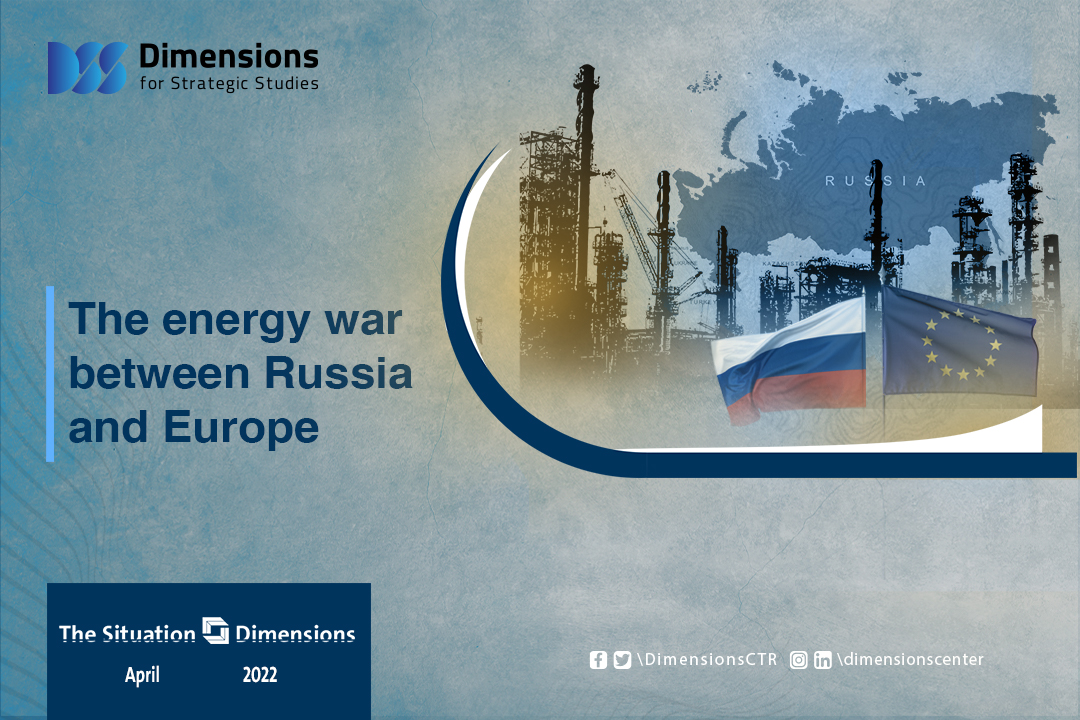
The energy war between Russia and Europe
2022-04-292252 view
Western countries have long been trying to dispense with Russian energy, and to diversify external sources for energy supplies. For this purpose, European countries work on getting energy from a number of countries and developing internal capabilities by investing in clean energy. Despite that, Russian gas remained the main source for EU countries with more than 200 billion cubic meters annually. Norway comes next as a source for European countries’ energy, providing about 140 billion cubic meters annually. Other countries, most notably Algeria, provide EU countries with about 50 billion cubic meters.
As the Russian invasion of Ukraine started, Russian gas and oil turned into a Russian weapon in the face of Western countries, as cutting off supplies could lead to a huge crisis for European countries; especially when Moscow demanded paying in rubles for gas. Russia in fact halted gas supplies to Bulgaria and Poland for not responding to that condition. Such an action is expected to constitute a major crisis not only for these two countries, but also for other European countries who get their supplies via pipelines go through these two countries. Ukraine, of course, is another state that loses the energy supplies because it is at war with Russia. Such countries could be threatened by an energy crisis during the coming winter.
The gas pipeline passing through Poland mainly feeds the Netherlands and the United Kingdom. These two countries, however, are capable to quickly dispense with Russian gas, as the UK has already announced its intention to phase out the Russian gas by the end of 2022. The Netherlands is a major source of gas as well.
The gas pipeline passing through Bulgaria also supplies Italy and Switzerland. The latter is an importer of Russian gas but in very small quantities, so that it can immediately wean itself off these supplies. Italy, on the other hand, imports about 25 billion cubic meters from Russia annually. However, Rome is expected to find alternative supplies for making up these quantities from Algeria, Libya and the United States. Meanwhile, Italy might maintain imports of about 12 billion cubic meters from Russia next year, to gradually decrease that quantity over five next years.
Germany, in particular, is considered the most affected party by this Russian weapon because it relies on Russian gas for nearly 40% of its total needs. It imports a third of its oil needs and half of its imports of coal from Russia. As such, Germany as the largest economy in Europe is directly engaged in the energy battle.
In the short term, Germany is expected to increase its imports from Norway and the Netherlands. This means that Norway must increase its production capacities, which have already maximum. Responsiveness, however, will not be great in the short run. At the same time, the Netherlands needs to boost production from Groningen gas field and go back on its pledges to the population to partly abandon it for reasons related to some difficulties resulting from excavations.
As for oil products, it is expected that Germany will depend more on the United States and some Gulf countries. The next five years, however, will be tough on Germany for dispensing with Russian gas cannot be achieved before this period. Within five years, Germany can increase its ability to produce energy locally through the introduction of more renewable energy projects and the reactivating its three nuclear reactors that it announced earlier to close. Such a move puts the German government face to face with the pressure of parties pressuring for the closure of these reactors.
The gradual dispensing with the Russian energy will deprive Russia from financial revenues, which will force Russia to search for other buyers of its products.
Dispensing with Russian energy can often be accompanied by sanctions that undermine Russia's ability to market its products.
As such, in the short run, the Russian energy weapon directed towards Western countries may seem effective and in Russia's interest; because it is an unsustainable instrument of pressure that loses ammunition as it is used and will not be useful in the mid and long terms. Therefore, Russia should balance between using it for short term, and putting it back in its sheath for future use, or using it to the maximum, but losing it at the mid and the long terms.





